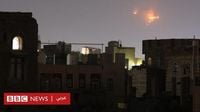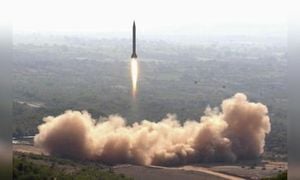Iran has categorically denied allegations of assisting the Houthi movement in Yemen to launch attacks against Israel, while simultaneously threatening to retaliate against any aggression directed at its territory. This statement comes in the wake of recent tensions following a missile strike by the Houthis on Ben Gurion Airport in Tel Aviv on Sunday, May 4, 2025.
The Iranian Foreign Ministry issued a statement on Monday, asserting that the Yemeni movement's support for the Palestinian people is a "consistent and unwavering decision". This reflects Iran's long-standing position of backing groups that oppose Israeli actions in the region.
In a related development, Iranian Deputy Defense Minister Al-Amid Nasir Zadeh warned that Iran would respond forcefully to any acts of aggression, specifically targeting American interests and bases. "If we are subjected to aggression, we will respond with strength and target all American interests and bases," he stated.
The Iranian Mehr Agency reported that Iran has developed a new ballistic missile named "Qassem Basir", capable of evading radar detection and equipped with advanced features such as a carbon fiber body and a maneuverable warhead, enhancing its resilience against electronic warfare.
Nasir Zadeh emphasized that while Iran holds no animosity towards neighboring countries, it views American bases as legitimate targets should Iran be attacked. This statement underscores the escalating rhetoric between Iran and the United States, particularly in the context of the Houthis, who control significant portions of Yemen, including its capital, Sanaa.
On the ground, the Houthi movement reported that around ten American airstrikes targeted Sanaa and its surroundings in retaliation for the missile attack on Israel. This escalation has raised concerns about further military engagements in the already volatile region.
Israeli Prime Minister Benjamin Netanyahu responded to the Houthi missile strike by vowing to launch new strikes against the group and Iran. He stated, "Israel will respond to the Houthi attacks on our territory at the appropriate time and place we choose, targeting their Iranian masters." This statement reflects Israel's ongoing strategy of countering perceived threats from Iranian-backed groups.
In light of these developments, Tehran reiterated its commitment to defend itself against any threats, warning Israel and the United States of the potential consequences of their aggressive posturing. The Iranian Foreign Ministry's statement highlighted the resolve of the Iranian people to defend their homeland.
Former U.S. President Donald Trump and his administration had previously issued threats against Iran due to its support for the Houthis, which adds another layer of complexity to the ongoing conflict in the region.
The missile strike on Ben Gurion Airport, which resulted in minor injuries to six individuals and a temporary halt to air traffic, marked a significant escalation in hostilities. Israeli authorities stated that the missile, launched from Yemen, fell near the main runway, prompting an immediate response from the Israeli military.
Israeli Defense Minister Israel Katz declared, "Anyone who strikes us will be struck back with seven times greater force." This statement reflects Israel's commitment to a robust military response to any attacks.
Following the missile strike, sirens sounded across various regions in Israel, indicating the heightened state of alert. The Israeli police confirmed the missile's impact, and footage from the scene showed damage consistent with a significant explosion.
In a statement, the Houthi military spokesperson, Yahya Saree, claimed responsibility for the missile attack, stating that it was executed in solidarity with the Palestinian cause. He emphasized that the missile successfully hit its target and warned international airlines against continuing flights to Ben Gurion Airport, labeling it unsafe for air traffic.
The Israeli Airports Authority later announced the resumption of normal operations at Ben Gurion Airport, although the incident has raised serious security concerns among travelers and officials alike.
In a broader context, the Houthis have consistently launched missile attacks against Israel as a show of solidarity with Hamas, especially during escalations in Gaza. However, successful penetrations of Israeli air defenses have been rare, making this incident particularly notable.
In response to the ongoing threat from the Houthis, Israel has conducted several retaliatory strikes against Houthi positions in Yemen, with the first targeting the strategic port of Hodeidah back in July 2024. The U.S. has also ramped up military operations against the Houthis since announcing a military initiative on March 15, 2025, aimed at curbing their influence in the Red Sea and Gulf of Aden.
As tensions continue to rise, the international community watches closely for developments. The situation remains fluid, with both Iran and Israel poised for potential escalation. The coming days and weeks will be crucial in determining whether this conflict will lead to broader military engagements in the region.
In a related development, Israeli sources reported that the security cabinet, led by Netanyahu, has approved a plan for a broad offensive to impose control over Gaza. This decision, announced on May 5, 2025, is said to include measures aimed at facilitating voluntary immigration for residents in response to ongoing hostilities.
As the situation evolves, the implications for regional stability and international relations remain uncertain, with both sides preparing for possible further confrontations.




